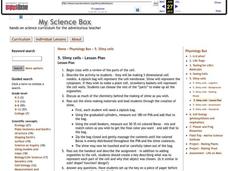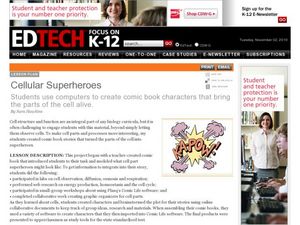Curated OER
A Cell Is Like A City
Students create analogies that help them remember the cell parts as well as their respective functions.
Curated OER
The Journey of a Red Blood Cell
Fifth graders examine how a red blood cell travels throughout the body. Using a model, they recreate the flow of blood through the heart. They also label the lungs and the differece between the blood that enters the heart and the blood...
Bonneville
Solar Energy Equity and Sustainability
Generate some knowledge about generating electricity. Pupils first read several articles to learn about solar energy, its advantages and disadvantages, and advancements in technology related to solar cells. They then have a class...
Science Matters
Hierarchy
A system is only as good as the sum of its parts! Young scholars explore the components of the different body systems using a hands-on lesson. The lesson helps learners build an understanding that there is a hierarchy of components in...
Curated OER
Cell Structure and DNA
Sixth graders identify, locate and describe the function of the parts of a cell. In groups, they state the five stages of mitosis and put them in the correct order. They are introduced to the structure of DNA and mRNA and how they...
Curated OER
Slimy cells
Students study the parts of a cell. In this chemistry instructional activity students complete an activity in which they make as much slime as they want.
Curated OER
Cell Works
Pupils identify the different parts of the cells and their functions. In this biology lesson, students create an analogy of a cell and its organelles. They make a poster and present it to class.
Curated OER
Know Your Telephone
Students describe the parts of a cell phone and role-play a phone call to a customer service representative. They compare/contrast the price of owning and using a cell phone in the U.S. and Venezuela.
Curated OER
Parts of a Spreadsheet
Learners create their own spreadsheet. They identify the different parts that make up a spreadsheet and organize their data. They practice using functions and formats.
Curated OER
Prokaryotes and Eukaryotes
Students study prokaryotes and eukaryotes and compare and contrast them. They review the parts of the cell and define th eterms prokaryotes and eukaryotes. In pairs, they identify the organelles in a prokaryotic cell and a eukaryotic...
Curated OER
Cell Organelles and Their Functions
Students will be using Inspiration, which is a graphic organizer computer program, to create their own model community where they will label the community parts with the corresponding organelle. They will have prior knowledge of cell...
Biology Corner
Cell Theory Rap
All that this will link you to is a rap about cell theory and organelles. Use it as an example for a creative assignment in your biology class. Divide the class into groups and assign them a topic for which they write and perform a skit,...
Illustrative Mathematics
How Many Cells Are in the Human Body?
Investigating the large numbers of science is the task in a simple but deep activity. Given a one-sentence problem set-up and some basic assumptions, the class sets off on an open-ended investigation that really gives some...
Nuffield Foundation
Observing Water Moving Through Plants
We know plants assist in the water cycle, but how do plants get water from the ground into the air? Through a series of demonstrations or labs, scholars observe the movement of water through plants. They microscopically view the cells...
Curated OER
Cell 1 Prokaryotic and Eukaryotic
Young scholars differentiate between prokaryotic and eukaryotic cells. They examine pictures of prokaryotes and eukaryotes and write down the differences between the two. They complete a Venn Diagram on the cells.
Curated OER
Cellular Superheroes
Ninth graders review cell information by making a comic book. In this cell lesson, 9th graders make the parts of cells into superheroes. They draw these superheroes on the computer and come up with a plot to make a comic book.
Curated OER
Games and Activities to Teach Molecular Genetics
Students demonstrate a working knowledge of cell interactions such as DNA replication, protein synthesis (transcription and translation), through active participation in a cooperative group.
Curated OER
Eukaryotic Animal Cell, Candy Cell Model: Science
Young scholars review the parts of the eukaryotic animal cell and construct a model using various types of candy.
Curated OER
Reviving Celery
The classic in-class demonstration using celery dipped into water with food coloring is the highlight of this biology lesson plan. Young scientists discover that organisms are made up cells and have distinguishing characteristics. After...
Teach Engineering
Active and Passive Transport: Red Rover Send Particles Over
I can move about freely, but you cannot. The class models the movement through cell membranes by way of passive and active transport. Members of the class play the roles of various proteins, atoms, compounds, and cell actions and mimic...
Curated OER
All The Bell & Whistles
Young adults are so eager to get that first cell phone. And, cell phones have so many cool extras! Learners conduct real-life research to determine which cell phone carrier offers the best deals on things like wall paper, ringtones, and...
Curated OER
Comparing Plans
Good consumer practices such as price comparison can make or break a budget. Youngsters research five different cell phone carriers and the plans they offer. They compile their data and determine which plan offers the best value. They...
Curated OER
Analyzing Advertising
Some ads really make products look great, and even better than they really are! Kids get into small groups to research and compare marketing used by various cell phone companies. They analyze advertisements, carrier options, and cell...
Other popular searches
- Animal Cell Parts
- Eukaryotic Cells Parts
- Parts of Cell Wall
- Animal Cell Parts Pictures
- Cell Function and Parts
- Animal Cell Parts Draw
- Label Animal Cell Parts
- Cell Types and Parts
- Label the Parts of a Cell
- Cells Parts
- Parts of Cello
- Eukaryote Cells Parts























